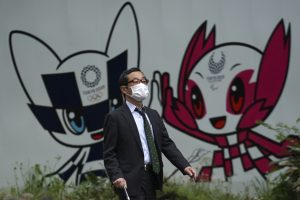“It is a problem that has happened every 40 years – it is the cursed Olympics, and that is a fact,” said Japan’s Deputy Prime Minister Taro Aso in March, commenting on the then-imminent postponement of the 2020 Tokyo Summer Olympics.
In 1940 Japan had planned to host the games, yet World War II forced their hand – as was the case with the London games four years later. The Moscow Olympics 40 years later in 1980 saw the West boycott the competition due to the Soviet invasion of Afghanistan, which eventually proved to be fatal for the communist regime. Forty years later, in 2020, Japan is battling the COVID-19 pandemic.
As in the past, the importance of a successful Olympic games remains crucial.
The significance of the Olympic Games as an instrument of political, economic, and prestige gain cannot be understated. The Berlin 1936, Moscow 1980, and Los Angeles 1984 games were meant to serve as examples of each prevailing political system’s superiority, while Athens 2004 and Rio 2016 were viewed as symbols of the host countries’ rejuvenation, despite ultimately materializing as unsustainable vanity projects. Likewise, the 2020 Tokyo Olympics are an attempt to cement Japan’s status as a continuous economic powerhouse and a major actor on the international stage, but also to encapsulate the legacy of Prime Minister Shinzo Abe and his Abenomics policies, implemented since 2012.
Upon returning to power eight years ago, Abe outlined an ambitious plan for Japan’s future course after decades of stagnation, comprised of the three now-famous arrows. In the realm of foreign policy, Japan was to pursue a global outlook, which to date has best manifested itself in successful free trade policies. The largest bilateral trade pact ever, between the EU and Japan, was signed in 2018 and the year before, Abe rescued the Trans-Pacific Partnership (TPP), the viability of which had come under scrutiny after the United States’ withdrawal. However, it was not the first time that Japan’s longest serving prime minister would use his influence; he had played a personal rule in pushing for Tokyo to be chosen to host the 2020 Olympics.
It was Abe who intervened at the 2013 IOC session to aid Tokyo’s bid, after concerns about safety had been raised due to the Fukushima disaster. For the prime minister, hosting the Olympic Games was not merely a question of national pride, but also a major opportunity to demonstrate his leadership skills after a devastating blow to his country’s wellbeing. The games would provide an ideal outlet to display to the global community Japan’s resilience in the face of adversity, while simultaneously boosting the nation’s economic performance and achieving Abe’s goal of preventing Japan from becoming a “tier two nation.” At the time, it was estimated that hosting such a massive undertaking would provide the country’s economy with a boost of $30 billion, with the creation of 150,000 new jobs.
Regionally, Japan remains the last of the greats not to host the Olympics in the current century. South Korea successfully staged the 2018 Winter Olympics, and improving inter-Korean relations took the spotlight. Ten years earlier, Beijing hosted the Summer 2008 Olympics in a grand manner, accompanied by ultimately unmaterialized hopes of the regime opening up to the world. In 2022, Beijing will become the first city to have hosted both the Summer and Winter Games. In the light of such developments, as well as China’s overarching global strategy of increasing influence, the success of Tokyo 2020 remains crucial for Abe’s own international outlook.
Now the Tokyo Olympics have been postponed to the summer of 2021 due to the COVID-19 pandemic. Tokyo 2020 President Yoshiro Mori has admitted that should the pandemic not be over by next summer, the Olympics would be cancelled. In terms of economic cost, such a scenario could result in a 1.4 percent GDP drop, reversing the hosting-related gains and then some. The possibility of the Olympics’ cancellation and the economic fallout created by the pandemic, coupled with the public’s disapproval of Abe’s coronavirus response, could deal a blow to the prime minister’s legacy. While an upset at the next lower house elections is unlikely, questions will be raised about the Liberal Democratic Party’s future course. With Abe not seeking another term as party leader, the pendulum could swing either way between his potential successors – Fumio Kishida, favored by Abe, and Shigeru Ishiba – with the cabinet approval rating possibly having a great effect on the eventual outcome.
As with the vast majority of pandemic-related issues, the ultimate outcome of the Tokyo Olympics and the supposed “curse” remains to be seen. Regardless, the effect on Shinzo Abe’s legacy will be notable, one way or the other.
Kristo Tamm is a news editor for Estonian Public Broadcasting (ERR) with master’s degree in Asian Studies from Tallinn University.
































